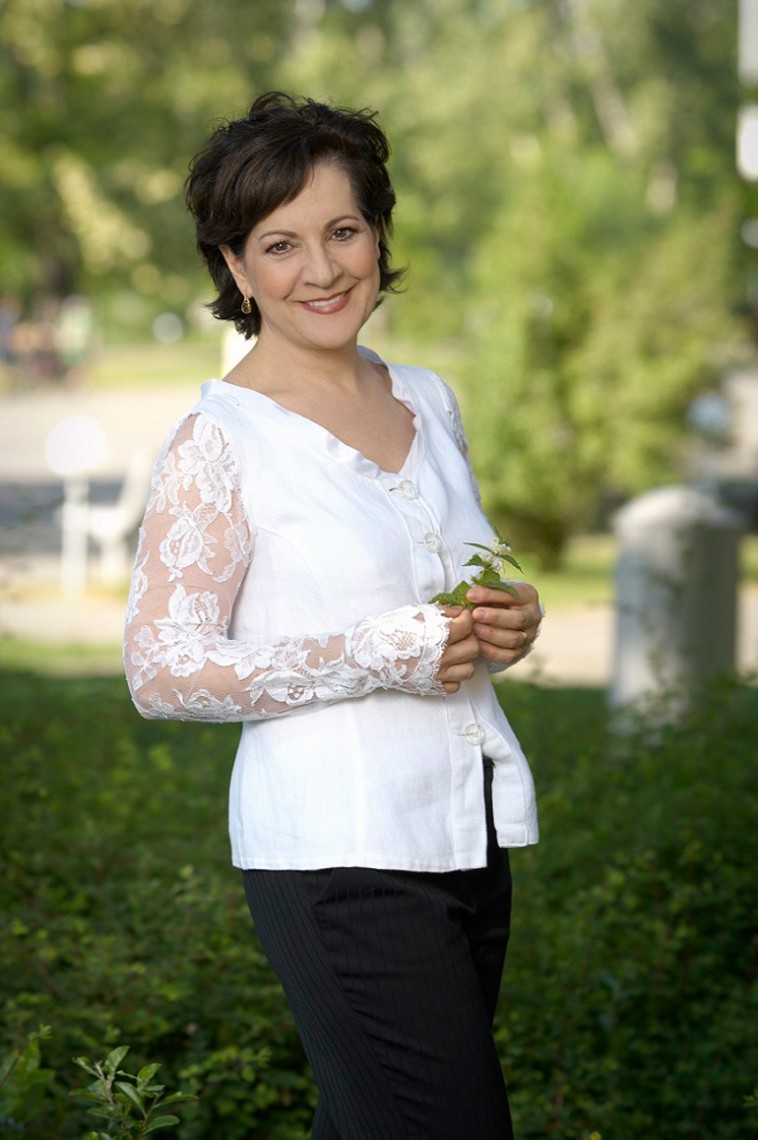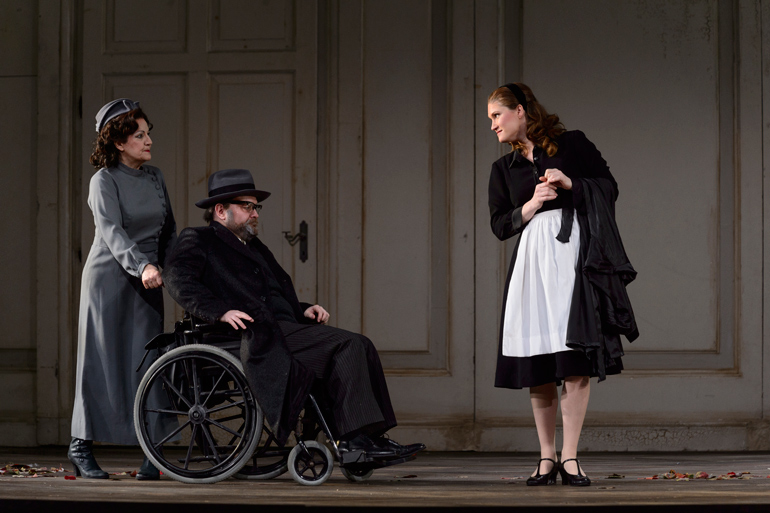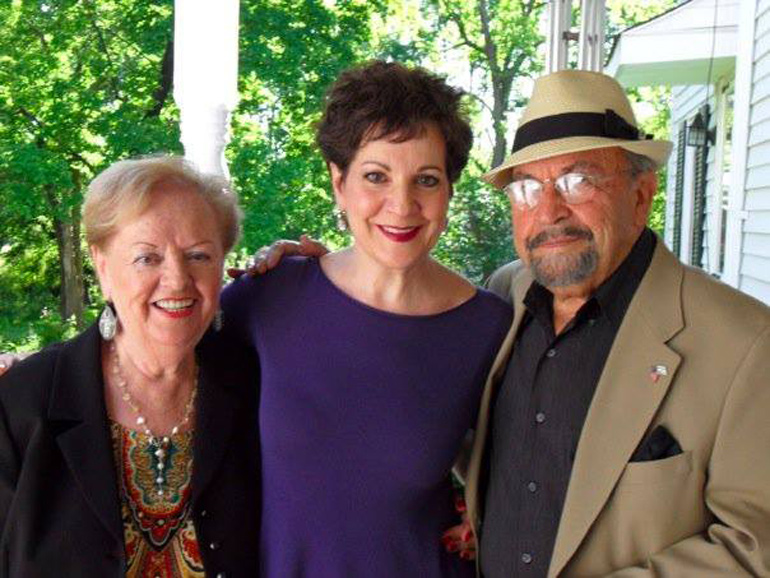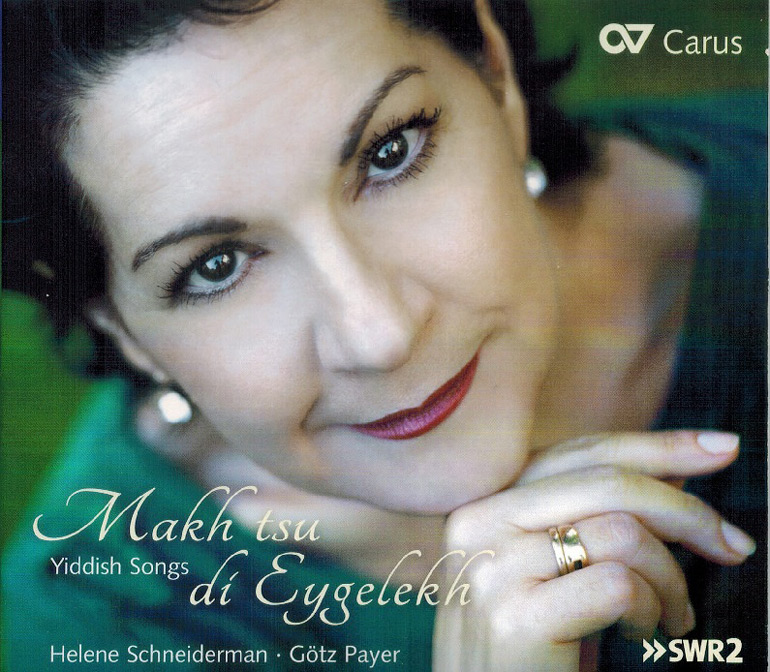American mezzo Helene Schneiderman reflects on her life as a child of Holocaust survivors, a singer, a wife, and a mother.

One of the joys of attending performances at the Canadian Opera Company is the many international artists the Company brings in every season. The current run of The Marriage of Figaro marks the Canadian debut of American mezzo Helene Schneiderman. On opening night, she was a scintillating Marcellina, combining excellent comic timing with a still fresh mezzo, remarkable after a 34-year international career. At the reception afterward where all the artists were honoured, COC General Director Alexander Neef paid special tribute to Schneiderman, calling her “My first opera singer.”
A native of New Jersey, Schneiderman studied singing at Westminster Choir College with voice teacher Suzan Pratt. After graduation, she attended the Cincinnati Conservatory of Music to pursue a Master’s degree in Vocal Performance with well-known Canadian mezzo Lucile Evans. At the encouragement of Evans, Schneiderman went to Germany to pursue an opera career in 1982, making her debut at the Heidelberg Opera. Two years later, she was invited to join the ensemble of Staatstheater Stuttgart, recognized as one of the important “A” houses in the German opera world. Not only is Stuttgart her artistic home for the last 32 years, she lives in Stuttgart with her husband Michael and their two daughters, Liviya and Lara. In 1998, the mezzo was awarded the title of Kammersängerin at Stuttgart in recognition of her service to music.
Throughout her long career, Schneiderman’s lyric mezzo was praised for its beauty and agility, with a timbre and technique well suited to the bel canto repertoire of Rossini. She was a noteworthy Cenerentola, Isabella, and Rosina, as well as an estimable Handelian and Mozartian, garnering accolades as Cherubino, Dorabella, Bradamante, and Sesto. While Stuttgart remains her artistic home, Schneiderman has guested extensively, in Munich, Salzburg, Paris, Rome, Covent Garden, Glyndebourne, New York City Opera, and San Francisco.

As is customary for a singer reaching full maturity, Schneiderman is adding to her repertoire character mezzo roles such as the Baroness in Vanessa, Old Countess in Pique Dame, and Podtochina in Shostakovich’s The Nose, while continuing to sing her meatier core roles of Marcellina, Annina, Madame Larina and Suzuki. She is slated to make her belated Metropolitan Opera debut next season as Annina in a new production of Der Rosenkavalier, to be conducted by James Levine and directed by Canadian Robert Carsen. While not on stage, the mezzo can be found in the classroom, “passing the torch” to the next generation of singers, as a professor at the Mozarteum in Salzburg.

I recently had a long conversation with Helene Schneiderman, about her unusual upbringing and her career trajectory. Helene’s parents, Judith and the late Paul Schneiderman, are Holocaust survivors – her mom survived Auschwitz and her father the concentration camps of Buchenwald and Dachau. After the war, the Schneidermans immigrated to America to begin a new life and raise a family. Helene was one of four children born and raised by their parents in Flemington, New Jersey, where they lived modestly on a chicken farm. The parents spoke Yiddish at home, and Helene and her three brothers learned to understand and speak it a little, all a part of growing up Jewish. In a home where both parents were amateur singers, the children had a rich life of music-making.
As a young girl, Helene always felt that she was different: “They only told us about the past when we were, at least, six, so that we would know why we had no grandparents. We used to ask them all the time because most children have three or four grandparents but all of ours were dead. It was kind of deep dark secret, and it influenced me at a very young age.” In our conversation earlier this week, I asked Helene to reflect on her life and her art, as a child of Holocaust survivors, a singer, a wife, and a mother…
JS: Tell us about your earliest memories of singing…
HS: I was maybe 6 or 7. It was my mother singing to us children sitting in the back seat of the car, driving from New Jersey to New York to visit my father’s uncle, Samuel Schneiderman and his wife. This is the uncle who helped my father get to America. My mother had a lovely voice, completely untrained; she had no idea how she did it. That was the gift she gave me.
JS: Is that how you learned the Yiddish songs?
HS: My parents both sang in the car a lot, and us kids would listen. One day my mom said, I’m going to teach you a nice Jewish song. It was Makh tsu di Eygelekh (Close Your Little Eyes), the title song of the disc. On many nights my mother tucked me into bed with this song. She would repeat it lovingly and patiently until I could sing it.
JS: What made you decide to go into music and singing as a career?
HS: That came much later. I liked watching musicals as a kid – Wizard of Oz, Sound of Music. My mother played opera records at home, but I wasn’t a fan. It wasn’t cool to like classical music in the 60’s. I mostly listened to pop – I liked Karen Carpenter, the sound of her voice and the words.
JS: Sounds like there was lots of music at home…
HS: My father was an amateur actor and my mother a singer. They weren’t professionals. We were very poor; my father was a chicken farmer. We made music on the farm. My brothers played the accordion and the piano – we had a cheap upright piano – and I would sing Elton John songs. I sang in choirs in high school. When friends came over, my mother would say “Sing for them, Helene, take off your glasses and sing for them…” I was very shy, but I loved to sing. People listening all thought I had a very pretty voice. My mother wanted so much for us to be musical. My second oldest brother is still a wonderful pianist.
JS: Do you remember your first opera?
HS: Someone took me to the Met to see Salome – can you imagine. I was pretty shocked by it …singing to a head! I thought opera was quite silly.
JS: What made you decide to take the big step, to take your first voice lesson?
HS: I was already 17, in my senior year in high school. I got the lead to play Dorothy in Wizard of Oz. The girl who was a student teacher at the time said to me – have you ever considered going into music? I replied I didn’t want to be a music teacher, but she said maybe I could be a professional singer. They drove me to the Westminster Choir College in Princeton. I learned one art song, one of those Italian Arie Antiche songs – that was my audition. The College took me immediately. I took a summer course on theory and harmony. Westminster Choir College wasn’t cheap – I had to borrow money.
JS: Who was your first voice teacher?
HS: My first voice teacher was Suzan Pratt. She taught me the love of singing and gave me the impetus to go on and stay in vocal performance. She said ‘you have the talent and a beautiful instrument.’ She made me go to graduate school, to Cincinnati where I studied with Lucile Evans. I have to say, how lucky I was…I was in the right hands!
JS: Did Lucile Evans encouraged you to go to Europe?
HS: Lucile more than encouraged me to go…she basically forced me to go. She knew my personality; she knew I wasn’t pushy. I went to AIMS in Graz, Austria – the American Institute for Musical Studies, a summer program. It was good for people like me who didn’t quite have the knock-on-the-door, pushy personality. I had great coaches there. The American Institute cost a fortune – I had to work like a dog in the summer. That was also the time when I was changing from soprano to mezzo. Being a mezzo, I got to be funnier (on stage)! I love the acting part of it.
IS: I am curious – given your parent’s history, what was their reaction when you told them you wanted to go to Germany?
HS: When I told them, they said ‘for a year that’s fine. But it’s not easy for us to let you go.’ I had been going to college only 30 miles away, and here I am preparing to go to Germany, a country where they had the most horrible experiences! My mother was 14 when she was taken to Auschwitz; her little sister immediately killed. My father was in his early 20’s during the war, and he escaped from a concentration camp. There were a lot of inner fears and hanging sadness. After all, it was on German soil, on European soil, that they lost everything. But my parents wholeheartedly let me go – they said ‘We love our daughter more than we hate any people. If she’s to go there to further her beautiful voice and her message to the world, we’re not going to hold her back.’ That shows how wonderful my parents are.
JS: What was your life like in those early years in Germany? As a young Jewish woman, were you fearful of anti-Semitism?
HS: I’m so fortunate…my life fell into place when I got to Germany. I was very conscious of speaking (correct) German, not come out sounding like Yiddish that my parents spoke. Although I never spoke Yiddish at home – I only answered my parents in English. It was also the 80’s and things had changed a lot in Germany. As an opera singer and an American, I never felt any anti-Semitism, never from the opera administration, never from the public. Within four weeks of arriving, I met Michael Flamme, a German-Jewish man, in the synagogue in Heidelberg. I felt a strong affinity to him; it felt like family.
JS: You parents were probably relieved and happy you had a Jewish boyfriend…
HS: They didn’t say ‘go find a Jewish husband’, but I knew it would hurt them badly (if I had married a German). When I was studying in Cincinnati, I worked as a singing waitress in a German restaurant to pay for the tuition. I had to sing I Lost My Heart in Heidelberg. I said to Trudie, a German woman who owned the restaurant – I’ll learn this song for you, but it’ll never happen, and I’ll never memorize the stupid words! I sang this song with the text in front of me. Then I came to Heidelberg, to a synagogue of all places, and met my husband! (Laughs) He was the only German-born Jew in this small community in Heidelberg.
JS: That’s such an interesting and funny story! Now tell me what was your voice like in those days. What made you go into Bel Canto?
HS: I had a very lyrical sound, a soft, warm timbre. People say I reminded them of Teresa Berganza or Frederica von Stade. I went into Bel Canto because it’s where my voice was at its best. I started as a soprano and switched to mezzo – it’s a question of where you feel you are at your best vocally and how you want to have your career.
JS: Who are your mentors?
HS: I would say Lucile Evans and Anna Reynolds, my vocal mentors. Suzan Pratt gave me the confidence to go on. I was only 22, at a very early part of a singer’s life. Leonard Bernstein also made a huge impression. I sang his Arias and Barcarolles in Bonn years ago at the Beethoven Festival – we did Beethoven and Bernstein. I was still nursing my older daughter Liviya. Here I was, nursing my baby, and who should walk into my shared dressing room but Bernstein, with a towel over his shoulder?! He said, ‘Hey honey would you mind me getting a cup of coffee here?’ There were people coming in and out – his agent, people getting autographs and Bernstein talking to me about things I should sing, how much he loved the way I sang his songs, etc. At the curtain calls, he literally knelt in front of me and kissed my hand – he had such a flair for the dramatics! That was a huge honour for me.
JS: Tell us about your Yiddish Songs CD (Makh Tsu Di Eygelekh: Yiddish Songs).
HS: Cornelius Hauptmann, the opera singer, came up with the idea of Wiegenliederprojekt, cradle songs in German for German children; it’s to promote singing among children. He picked 40 singers, mostly Germans, each of us sang a lullaby, donating our fees. There are now 5 or 6 albums, with some names you’ll recognize. Even Jonas Kaufmann sang a duet with his then-wife who is a mezzo – he was my Lindoro 30 years ago! Hauptmann asked me to sing a Jewish song. Yiddish is comprised of Middle High German. The song I sang, Shlof mayn feygele, is used in a recent film. They wanted my mother to sing in the movie, but she didn’t feel she could handle that at this stage of her life. It’s a short German movie about the Nordsee. In the end, you hear my song, and you see the birds flying… it’s an honour. The money (made from the CD) goes to children with heart problems. After that, people say to me – oh it’s so beautiful, so melancholy, you must do more. That started my idea of a Jewish song disc. With the help of my pianist Götz Payer, I recorded a disc of Yiddish Songs for Carus-Verlag, in partnership with SWR2 (Southwest German Radio 2).

JS: How did you decide on the songs to be included on the disc?
HS: Most of the songs I learned from my parents singing them to us children. The title song, Makh tsu di Eygelekh my mother sang to me when she tucked me into bed. When I came to Germany in 1982, my parents sent me a cassette filled with their Yiddish songs. They wanted me to listen to them sing whenever I felt homesick. I’ve chosen four from the cassette to be included on this CD. My parents sang these without accompaniment. These songs are a document of a special period in time… my mother had to sing in the concentration camp in order to survive. She recently published a book about her experiences – www.isangtosurvive.com. Her having to sing to survive is another big reason that I went into music and singing. So I have my parents to thank for not only the songs, which are a large part of my identity, but also for the gift of singing.
Makh Tsu Di Eygelekh: Yiddish Songs is available for purchase via Amazon.com and iTunes.
#LUDWIGVAN
Want more updates on Toronto-centric classical music news and review before anyone else finds out? Get our exclusive newsletter here and follow us on Facebook for all the latest.



